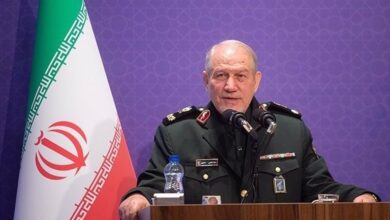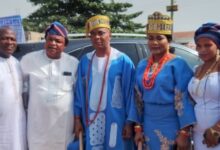“You are not a thief because you steal, you steal because you are a thief” – UNILAG VC
*As Gen Ishola Williams laments, "We are in era of selfishness with greed" *You cripple a nation when you undermine its education - Rafsanjani *As Professor Babawale names enemies of Nigeria as political profiteers and VIPs of waste
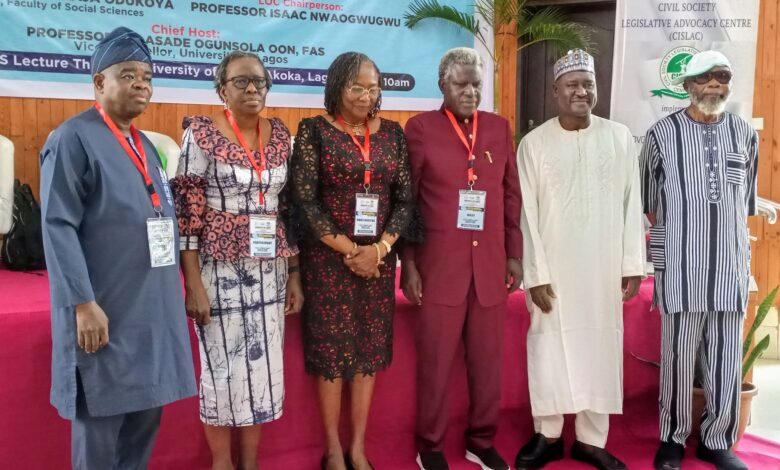
By BASHIR ADEFAKA
“When you become public officer who does not need an oversight and who then begins to do things anyhow without due process, corruption is knocking at your door,” said Professor Babawale.
From the modest yet moderately gigantic auditorium of Faculty of Social Sciences, University of Lagos, on Thursday September 18, 2025, roared the painful voices of selects in Nigeria, who see corruption – not only as parasite – like late former President Muhammadu Buhari would always say – but also as a systemic killer disease that, if not tamed on time, will not only undermine good governance but more destructively damage the very fabrics of nation’s existence.
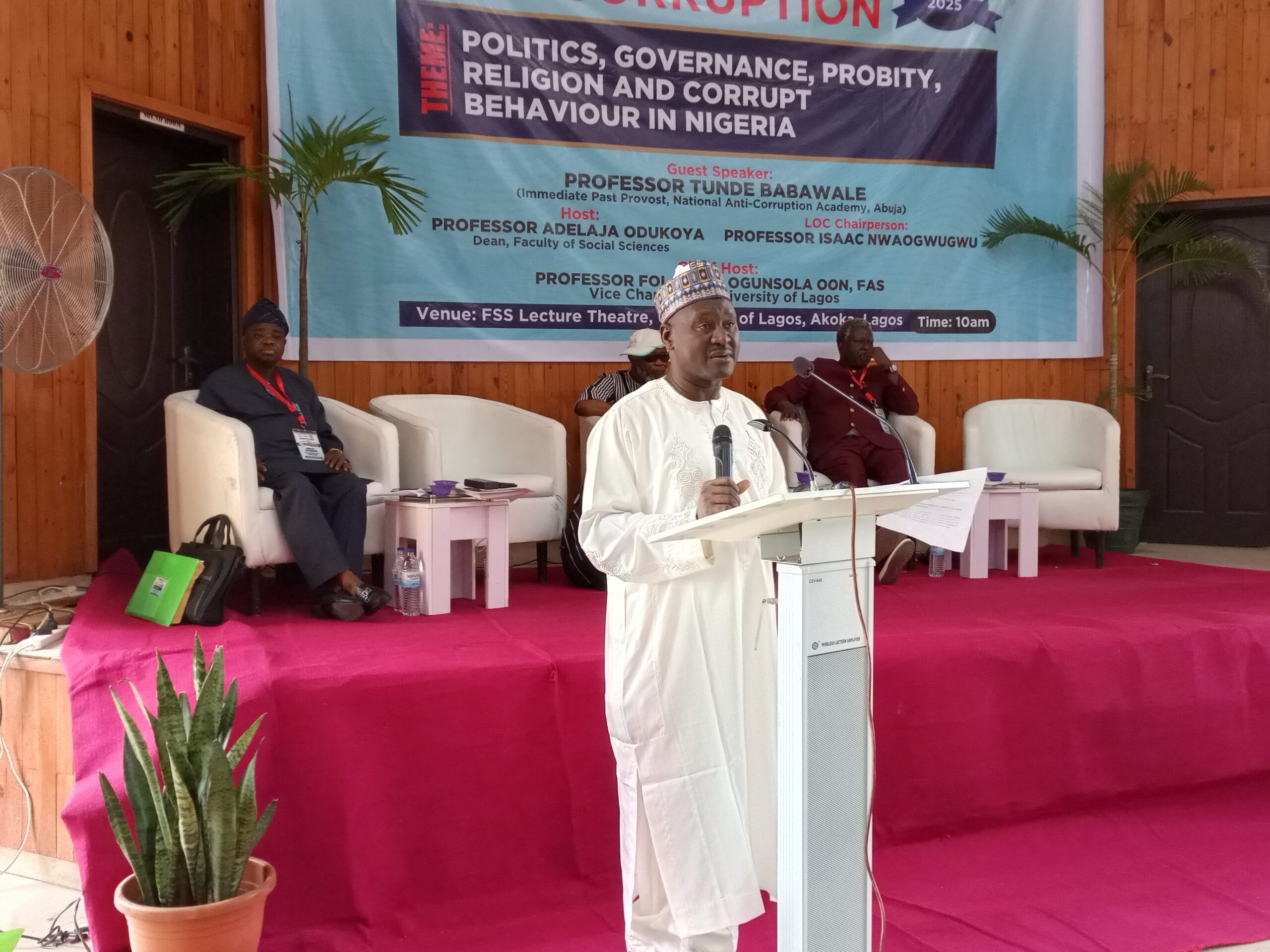
Among the voices are those of Vice Chancellor of the University of Lagos, Professor Folasade Ogunsola, OON, Director General of the Pan-Africana Strategic and Policy Research Group (PANAFSTRAG), Major General Ishola Williams (Rtd), Executive Director, Civil Society Legislative Advocacy Centre, Mallam Auwal Musa Rafsanjani, Dean of the UNILAG Faculty of Social Sciences, Professor Adrlaja Odukoya, and Immediate past Provost of National Anti-Corruption Academy, Abuja, Professor Babatunde Babawale, during an International Conference on Anti-Corruption themed: “Politics, Governance, Probity, Religion and Corrupt Behaviour in Nigeria”.
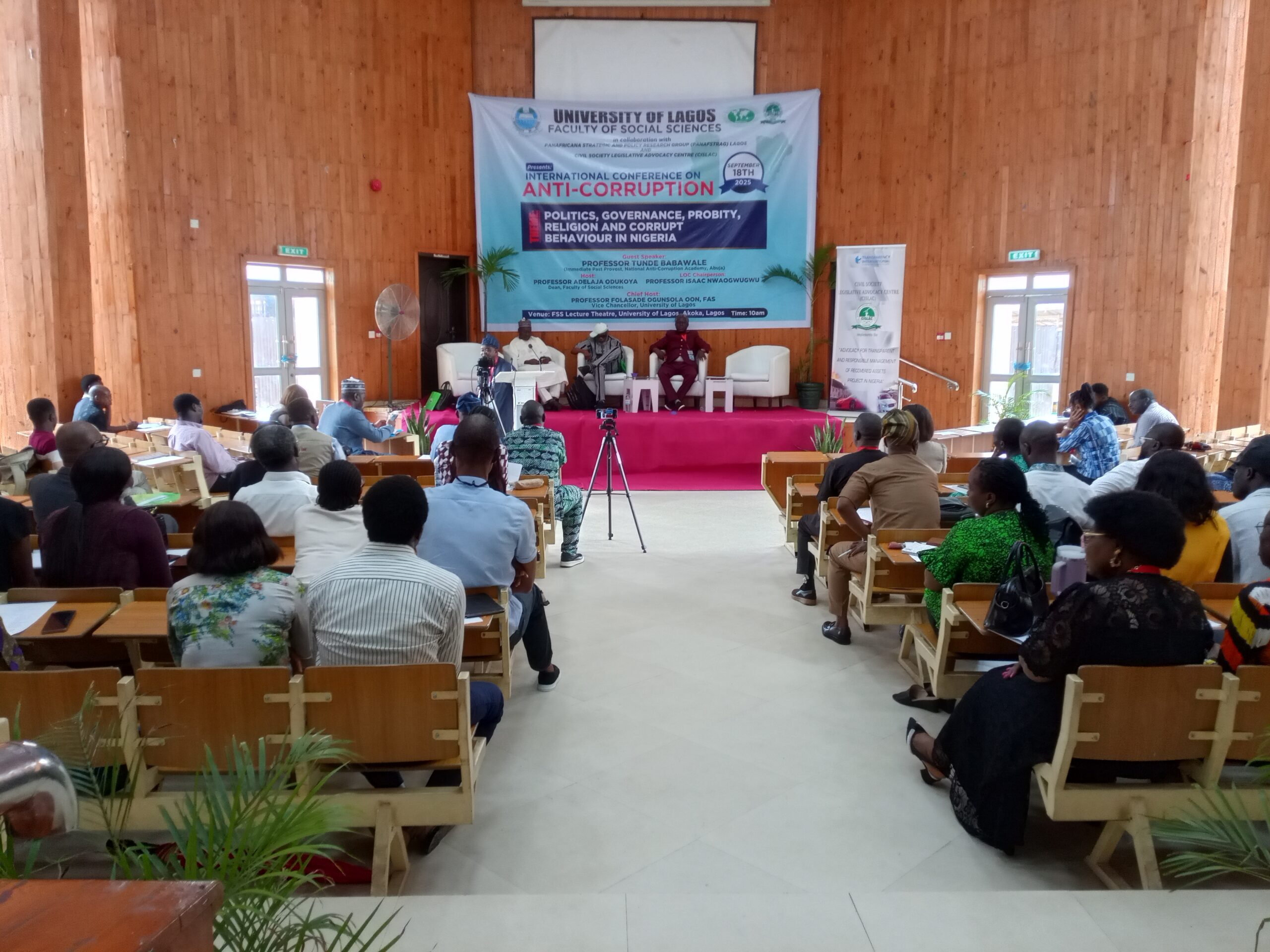
Declaring open the event, the VC, Professor Ogunsola, simply defined corruption as abuse of entrusted of power for personal gain. She noted further that favouritism is another way to describe corruption.
“Corruption is a mindset. You are not a thief because you steal. You steal because you are a thief,” said the UNILAG VC.
In his submission, former Commander Nigerian Army Signals and DG PANAFSTRAG, Major General Ishola Williams (Rtd), lamented the current state of Nigeria in the wake of an admittance of corruption not only as a pandemic but also a norm.
“We are in an era of human selfishness with greed. Everybody tends to say he has integrity but it’s a lie. I am not here to preach because I am not a pastor. Our Constitution should be changed to that of France where, once you are arrested you are guilty,” said General Williams.
He listed the set of people he blamed for the hyped corruption in the country to include mainly the lawyers, accountants and media practitioners.
The General, whose non-governmental organisation (NGO) is one of the three organisers of the conference along with CISLAC and UNILAG FSS, queried as he asked why lawyers, accountants and journalists would know that people are corrupt and still respectively take up the brief to defend them in the courts, the books and on the pages of the newspapers or in the media generally.
In his remarks, CISLAC Executive Director, Mallam Auwal Musa Rafsanjani, pointed out one of the effects of corruption as undermined education, adding that, “If you want to cripple a nation, you undermine education.”
He queried the conscience of leaders who, after having benefitted from education in the country, are now in power only to be indifferent about making education not only affordable but also qualitative for the people.
According to Rafsanjani, when people without education or good conscience are in power, they undermine education. He declared CISLAC’s preparedness to to partner with the University of Lagos on the issue of of anti-corruption fight.
From his prepared speech the CISLAC and Transparency International Nigeria Chief sought indulgence of the hall in recognising the efforts of General Ishola Williams, who has been at the forefront of sanitising governance in Nigeria having served the nation with honour, rising to the position of Commander of Nigerian Army Signals, Commander of Training and Doctrine (TRADOC), and Chief of Defence Training and Planning.
“Despite his distinguished service, he left the army in 1993 without wealth, but with integrity and an honest lifestyle that continues to inspire many. I had the privilege of working under his guidance in the transparency movement in Nigeria, and I can testify to his commitment to justice and probity. General, we thank you for your service and for continuing to show us that integrity is a far more enduring legacy than riches. His example underscores why this conversation on probity and corruption is so critical,” he acknowledged.
Rafsanjani continued, “I am honoured to represent the Civil Society Legislative Advocacy Centre (CISLAC) at this important International Conference on Anti-Corruption. Let me commend the University of Lagos, the Faculty of Social Sciences, and our partner, the PanAfricana Strategic and Policy Research Group (PANAFSTRAG), for this collaborative effort. CISLAC is proud to continue working with these institutions, as it is only through partnerships that corruption can be effectively minimised in our country.
“Corruption is a major impediment to Nigeria’s growth and development. It distorts governance, undermines public trust, and entrenches inequality. But today, I want to specifically highlight the education sector, because if we fail to safeguard education, we endanger the future.
“From underfunding, mismanagement of resources, bribery in admissions, to the “sorting” culture and contract inflation, corruption in education cripples the ability of schools to serve as centres of knowledge, character, and innovation. If our tertiary institutions cannot produce graduates who value honesty and accountability, then the cycle of corruption will continue.
“There is urgent need for our institutions to mainstream anti-corruption as a priority. Universities must not only teach knowledge but also instill ethics and values.
“Tertiary institutions can and should play a vital role in reorienting the mindset of students, encouraging them to be focused on learning and not vulnerable to corrupt practices. Nigerian youth must reject the glorification of looters and instead embrace models of integrity and service. Looters are not adding value to solving our national challenges; they should not be celebrated, but rejected. Furthermore, sexual harassment and exploitation (Sextortion) which has become prevalent in tertiary institutions is a form of gender corruption which should be tackled with by putting in place effective mechanisms and policies within tertiary institutions, we also urge the federal government to pass into law and enact the legal framework before the National Assembly which seeks to criminalise sexual harassment in tertiary institutions in Nigeria.
“We must encourage every sector: academia, government, civil society, and religious institutionsto continue playing their roles in discouraging corruption. Ethics and probity should not be abstract ideals, but daily principles. If corruption is to be minimised, the Nigerian state must earn and retain public support for institutions like the Independent Corrupt Practices and Other Related Offences Commission (ICPC) and the Economic and Financial Crimes Commission (EFCC). These agencies need both political backing and public trust to succeed.
“In fact, states and local governments, where many acts of corruption occur, should replicate institutions like the ICPC to strengthen governance at grassroots levels.
“Another area of concern is money laundering and illicit financial flows, which continue to drain our resources and weaken our economy. Unless we tackle this with seriousness, Nigeria will continue to lose revenues that could have been invested in education, healthcare, infrastructure, and social welfare.
“As Nigeria’s national chapter of Transparency International, CISLAC has been at the forefront of evidence-based advocacy against corruption. We engage policymakers, legislators, and institutions to drive reforms. We produce shadow reports, such as our Annual SDG 16 Report, which tracks Nigeria’s progress on peace, justice, and strong institutions.
“Colleagues, corruption is not insurmountable, but fighting it requires sincerity, unity, and action. Our universities must produce ethical leaders. Our civil society must continue to advocate. Our government must provide the political will. Our youth must embrace integrity as their guiding principle.
“CISLAC is committed to working with the University of Lagos, the Faculty of Social Sciences, and PANAFSTRAG to advance this agenda. Together, let us ensure that Nigeria builds a society where probity triumphs over corruption, where institutions are strong, and where future generations can thrive in dignity,” said the CISLAC boss.
Delivering his keynote address titled, “Politics, Governance, Probity, Religion and Corrupt Behaviour in Nigeria”, the guest speaker, Professor Babatunde Babawale, said “the topic of the day is something that should set us thinking”, requesting the participants to appreciate 84-year-old General Ishola Williams for what he said the retired signals officer has done for anti-corruption in Nigeria and Africa.
He then kicked off his address citing the speech of the first Nigerian military coup read by Major Chukwuma Kaduna Nzeugwu of 1966, centred on what he called political profiteers and VIPs of waste as “our enemies”.
Interactively, he asked, “Are the political profiteers of 1966 still with us?” The audience chorused “Yeees!” Noting that corruption has become systemic in Nigeria, Professor Babawale, a professor of political science University of Lagos, aligned with the Vice Chancellor Folasade Ogunsola’s definition of corruption as abuse of entrusted power for personal gain but posited that “it goes beyond that. Then abuse of authority or position either to benefit yourself or a clique you have created is corruption. When you do this, you are a corrupt public officer.”
He then listed four consequences of corruption saying it undermines good governance, can lead to misappropriation of funds, the weakening of value system and intensification of poverty both of the nation and among the populace.
“When you become public officer who does not need an oversight and who then begins to do things anyhow without due process, corruption is knocking at your door,” said Professor Babawale.




